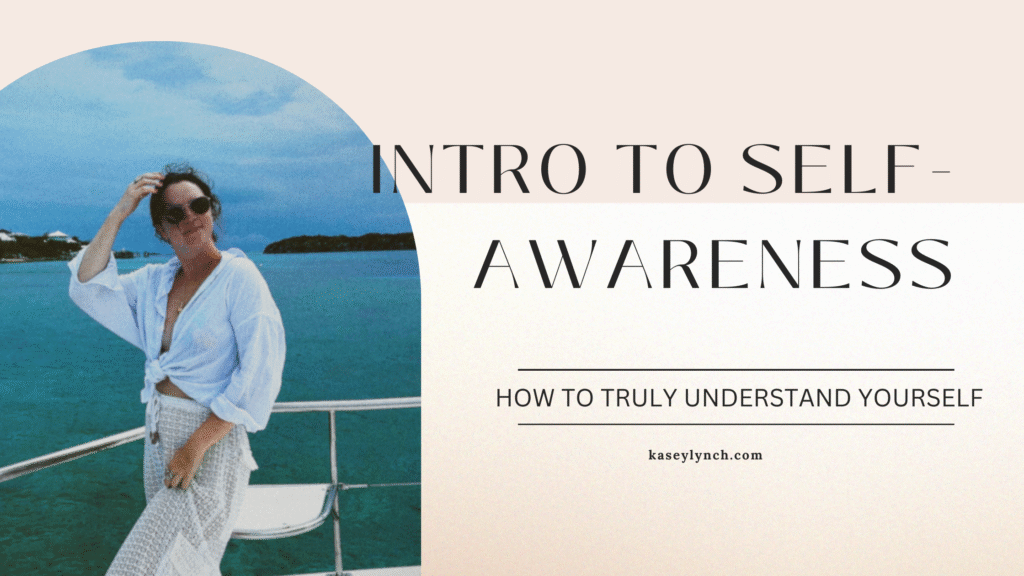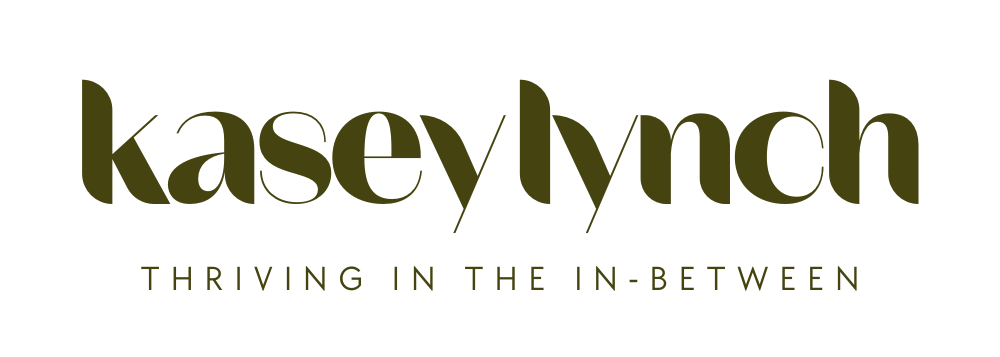Last Updated on 2 weeks ago by Kasey Lynch

Imagine a compass that always points you toward your true north, helping you navigate life’s complexities with clarity and purpose. That compass is self-awareness.
It’s the profound ability to understand yourself — your thoughts, emotions, beliefs, and behaviors — and how they shape your experience and impact the world around you.
In a world that constantly pulls us in different directions, taking the time to truly know yourself is an act of profound self-care and empowerment. It’s about coming home to yourself, recognizing your authentic self, and living in alignment with who you truly are.
This journey isn’t always easy, but it’s one of the most rewarding paths you can embark on.
This guide will explore what it means to be self-aware, why this skill is so vital, and practical, actionable steps you can take to cultivate and deepen your own self-awareness.
What Exactly is Self-Awareness?
At its core, self-awareness is the conscious knowledge of one’s own character, feelings, motives, and desires. It’s the ability to step back and observe yourself, almost as if you were an outside observer. This isn’t just a fleeting thought; it’s an ongoing process of understanding and recognizing the intricate workings of your inner world.
To be self-aware means to have a clear perception of your personality, including your strengths, weaknesses, thoughts, beliefs, motivations, and emotions. It’s about understanding what makes you tick, what drives your decisions, and what truly matters to you. This understanding extends to how you perceive yourself and how you believe others perceive you.
Think of it as having a comprehensive internal map. When you’re self-aware, you can:
- Identify your emotions: You can recognize what you’re feeling in the moment, whether it’s joy, frustration, anxiety, or peace – and understand why those feelings might be arising.
- Understand your beliefs: You’re conscious of the core beliefs that guide your actions and shape your worldview, and you can question whether they still serve you.
- Observe your behaviors: You notice your patterns of behavior, both positive and negative, and can connect them to your underlying thoughts and feelings.
- Recognize your values: You know what principles are most important to you and can assess whether your life choices align with them.
- Grasp your motivations: You understand the deeper reasons behind your desires and actions, moving beyond superficial explanations.
This deep understanding isn’t about judgment; it’s about clarity. It’s a skill that allows you to navigate life with greater intention and authenticity, making choices that truly resonate with your inner self.
Related: 35 Podcast Episodes That Will Rewire Your Brain for Growth, Confidence & Clarity
The Two Sides of Self-Awareness: Internal and External
While self-awareness might seem like a singular concept, researchers often break it down into two distinct, yet interconnected, types: internal and external self-awareness. Understanding both is key to a holistic view of yourself.
Internal Self-Awareness (Private Self-Awareness)
Internal self-awareness refers to how clearly we see our own values, passions, aspirations, and how well we fit with our environment. It’s about understanding our reactions, including our thoughts, feelings, and behaviors, and how they impact others. This is the introspective side of self-awareness, focusing on your inner landscape.
When you possess strong internal self-awareness, you:
- Know your core values: You can articulate what truly matters to you and use these values as a compass for your decisions.
- Understand your emotional landscape: You’re adept at identifying your feelings as they arise, understanding their triggers, and recognizing their impact on your mood and actions. This is a cornerstone of emotional intelligence.
- Are aware of your strengths and weaknesses: You have a realistic assessment of your capabilities and areas where you can grow, fostering self-knowledge and self-improvement.
- Recognize your thought patterns: You can observe your internal dialogue, identify recurring thoughts, and challenge unhelpful beliefs.
- Understand your purpose: You have a sense of what gives your life meaning and direction, contributing to your overall well-being.
Cultivating internal self-awareness often involves self-reflection, introspection, and a conscious focus on your inner experiences. It’s about developing a deep, personal understanding of who you are when no one else is watching.
Related: The Real Reason You’re Stuck — and How Self-Trust Can Set You Free
External Self-Awareness (Public Self-Awareness)
External self-awareness is about understanding how other people perceive us. It’s the ability to see yourself from an outsider’s perspective, recognizing how your actions, words, and demeanor are interpreted by others.
This type of self-awareness is crucial for effective relationships and social interactions. When you have strong external self-awareness, you:
- Understand your impact: You’re aware of how your behavior affects those around you, whether positively or negatively.
- Are open to feedback: You actively seek and genuinely consider feedback from others, even if it’s challenging to hear.
- Can adapt your communication: You adjust your communication style based on your audience and the situation, leading to more effective interactions.
- Recognize your reputation: You have a sense of how you are generally regarded by your peers, colleagues, and loved ones.
It’s important to distinguish external self-awareness from self-consciousness. While self-consciousness often involves an anxious preoccupation with how others see you, external self-awareness is a more objective and strategic understanding. It’s about gathering information to improve your relationships and effectiveness, rather than being paralyzed by fear of judgment.
Both internal and external self-awareness are vital. Internal awareness provides the foundation of who you are, while external awareness helps you navigate your place in the world and refine your interactions with other people. The most self-aware people are those who can balance both perspectives, integrating their inner truth with how they are perceived by others.
Why Does Self-Awareness Matter? The Power of Understanding Yourself
You might be wondering, “Why is self-awareness so important?” or “Is it good to be self-aware?” The answer is a resounding yes.
Self-awareness is not just a desirable trait; it’s a fundamental skill that underpins personal growth, professional success, and overall well-being. It’s the main purpose of self-awareness to empower you to live a more intentional, fulfilling, and impactful life.
Here’s why cultivating self-awareness is so powerful:
Improved Decision-Making
When you’re self-aware, you understand your values, priorities, and motivations. This clarity allows you to make decisions that are truly aligned with who you are and what you want, rather than being swayed by external pressures or fleeting impulses.
You can consciously choose paths that resonate with your authentic self, leading to greater satisfaction and fewer regrets.
Related: Creating an Intentional Life — One Small Decision at a Time
Stronger Relationships
Understanding yourself deeply is the first step to understanding others. Self-awareness helps you recognize your own emotional triggers, communication patterns, and needs, which in turn allows you to better understand and empathize with the people in your life.
This leads to more authentic connections, reduced conflict, and the ability to build healthier, more fulfilling relationships. You can communicate your needs more clearly and respond to others with greater compassion.
Enhanced Emotional Intelligence
Self-awareness is the bedrock of emotional intelligence. By recognizing and identifying your emotions as they arise, you gain the ability to manage them effectively. Instead of being overwhelmed by feelings, you can observe them, understand their source, and choose how to respond.
This skill helps you regulate your mood, handle stress, and navigate challenging situations with greater composure.
Greater Well-being and Mental Health
A deep understanding of yourself contributes significantly to your mental health and overall well-being. When you’re aware of your needs, you’re better equipped to meet them. You can identify sources of stress, practice self-compassion, and develop coping mechanisms that truly work for you.
This reduces anxiety, boosts resilience, and fosters a sense of inner peace and contentment.
Personal Growth and Self-Improvement
Self-awareness is the catalyst for continuous self-improvement. By recognizing your strengths, you can leverage them more effectively. By acknowledging your weaknesses or areas for development, you can consciously work on them.
This ongoing process of learning and evolving helps you achieve your potential, build self-efficacy, and cultivate a strong sense of self-esteem. It’s about becoming the best version of yourself, not for others, but for you.
Effective Leadership and Communication
For those in leadership roles or anyone who interacts with others professionally, self-awareness is invaluable. Understanding your own leadership style, biases, and communication habits allows you to lead more effectively, inspire trust, and foster a positive work environment. You can better perceive how your actions are interpreted by your team and adjust your approach for optimal outcomes.
Self-Awareness as a Skill
Perhaps one of the most empowering aspects of self-awareness is that it is a skill — not an innate trait that some have and others don’t. This means it can be learned, practiced, and developed over time. With consistent effort and the right tools, anyone can become a more self-aware person.
What Does it Mean to Lack Self-Awareness?
Just as self-awareness brings numerous benefits, a lack of it can lead to significant challenges in various aspects of life. What does it mean to lack self-awareness? It means operating without a clear understanding of your internal landscape and how you are perceived by others. This can manifest in several ways:
- Poor Decision-Making: Without understanding your true values or motivations, you might make choices that don’t serve your long-term goals or lead to dissatisfaction. You might repeatedly fall into the same patterns or make impulsive decisions.
- Strained Relationships: If you’re unaware of how your words or behaviors impact other people, you might inadvertently offend, frustrate, or alienate those around you. You might struggle to understand why relationships falter or why others react to you in certain ways.
- Emotional Outbursts or Suppression: A lack of awareness about your emotions can lead to either uncontrolled emotional reactions or the suppression of feelings, which can be detrimental to mental health. You might feel overwhelmed by your feelings without understanding their source.
- Feeling Lost or Unfulfilled: Without a clear sense of your passions, purpose, or values, you might feel adrift, lacking direction, or experience a persistent sense of emptiness, even if you achieve external success.
- Repeating Mistakes: If you don’t understand the underlying beliefs or behaviors that lead to negative outcomes, you’re more likely to repeat the same mistakes in your personal and professional life.
- Resistance to Feedback: Individuals lacking self-awareness often struggle to accept constructive criticism, viewing it as an attack rather than an opportunity for growth.
What causes a lack of self-awareness? It’s rarely a conscious choice. It can stem from a variety of factors, including:
- Busyness and Distraction: In our fast-paced world, many people don’t take the time for quiet self-reflection.
- Fear of Introspection: Sometimes, looking inward can be uncomfortable, especially if it means confronting difficult truths or past experiences.
- Lack of Feedback: If you’re not surrounded by people who are willing to offer honest, constructive feedback, or if you’re not open to receiving it, your external self-awareness can suffer.
- Unexamined Beliefs: Holding onto outdated or unhelpful beliefs about yourself or the world can prevent you from seeing things clearly.
Recognizing these signs is the first step toward cultivating greater self-awareness and moving towards a more conscious and fulfilling way of living.
How to Cultivate and Deepen Your Self-Awareness (Actionable Steps)
The journey to becoming a more self-aware person is a continuous one, requiring consistent effort and a willingness to look inward. It’s a process that takes time, but the rewards are immeasurable. If you’re wondering, “How do I know if I am truly self-aware?” or “How do you tell if you are self-aware?”, the answer lies in actively engaging with these practices.
Here are actionable steps you can take to cultivate and deepen your self-awareness:
1. Practice Self-Reflection Regularly
Self-reflection is the cornerstone of internal self-awareness. It involves consciously thinking about your experiences, thoughts, and feelings.
- Journaling: Dedicate a few minutes each day to write down your thoughts, feelings, and observations. Ask yourself questions like:
- What emotions did I experience today, and why?
- What decisions did I make, and what motivated them?
- What went well, and what could have gone better?
- What beliefs were challenged or reinforced?
- How did my behavior impact others?
- Mindfulness and Meditation: These practices train your focus to be present and observe your thoughts and feelings without judgment. Even 5-10 minutes a day can significantly enhance your awareness of your internal state.
- Asking “Why?”: When you experience a strong emotion or react in a certain way, pause and ask yourself “Why?” Dig deeper than the surface-level explanation. For example, if you feel frustrated, ask why you’re frustrated, then why that reason bothers you, and so on, until you uncover the root cause.
- Regular Check-ins: Throughout your day, take brief moments to check in with yourself. “How am I feeling right now? What am I thinking? What do I need?”
Related: Self-Reflection Journal Prompts for Personal Growth and Self-Discovery
2. Seek Feedback from Others
To develop external self-awareness, you need to understand how other people perceive you. This requires courage and an open mind.
- Ask Trusted Individuals: Approach friends, family members, mentors, or co-workers whom you trust and ask for honest feedback. Frame your questions specifically: “What’s one thing you think I do well?” or “Is there anything I do that you find challenging?” or “How do you perceive my communication style?”
- Be Open to Constructive Criticism: Listen actively without becoming defensive. Remember, their perception is valuable data, even if it doesn’t perfectly align with your self-image. Thank them for their honesty.
- Observe Reactions: Pay attention to non-verbal cues and how people respond to your words and actions. Do they seem engaged, confused, or uncomfortable?
3. Pay Attention to Your Emotions
Your emotions are powerful signals. Learning to recognize and identify them is crucial for self-awareness.
- Name Your Feelings: Move beyond “good” or “bad.” Try to pinpoint specific emotions like joy, anger, sadness, excitement, anxiety, or contentment.
- Understand Triggers: What situations, people, or thoughts consistently evoke certain emotions in you? Recognizing these triggers allows you to anticipate and manage your reactions.
- Explore the Physical Manifestations: How do emotions feel in your body? Tension, lightness, warmth, tightness? Connecting physical sensations to emotions deepens your understanding.
4. Observe Your Behavior Patterns
Our behaviors often reveal our underlying beliefs and motivations.
- Notice Recurring Actions: Are there certain behaviors you repeat, especially under stress or in specific situations? For example, do you tend to procrastinate, become defensive, or withdraw?
- Connect Behavior to Outcomes: What are the consequences of your typical behaviors? Do they lead to the results you desire, or do they create obstacles?
- Identify Habits: Become conscious of your daily habits — both productive and unproductive. How do they serve or hinder you?
5. Identify Your Values and Beliefs
Your values and beliefs are the invisible forces that guide your life. Bringing them into conscious awareness is transformative.
- List Your Core Values: What principles are most important to you? (e.g., integrity, compassion, freedom, security, creativity, growth). How do these influence your decision-making?
- Examine Your Beliefs: What do you believe about yourself, others, and the world? Where did these beliefs come from? Are they still true and helpful, or are some limiting you?
- Assess Alignment: Are your actions and choices aligned with your stated values and beliefs? Discrepancies can be a source of internal conflict.
6. Spend Time Alone
In our hyper-connected world, dedicated time for solitude is rare but essential for self-awareness.
- Create Space for Contemplation: Disconnect from distractions — put away your phone, turn off the TV. Use this time for quiet reflection, journaling, or simply being present with your thoughts.
- Engage in Solitary Activities: Go for a walk in nature, read a book, or engage in a hobby that allows for quiet focus. These activities can provide mental space for insights to emerge.
Curious why healing can feel so lonely? Check out this quick video.
7. Engage in Self-Assessment Tools
While not a substitute for deep introspection, personality tests or values assessments can offer a starting point or new perspectives.
- Personality Inventories: Tools like the Myers-Briggs Type Indicator, Enneagram, or StrengthsFinder can provide frameworks for understanding your preferences and natural inclinations.
- Values Clarification Exercises: Many online resources or books offer exercises to help you identify and prioritize your core values.
8. Practice Self-Compassion
The journey of self-awareness can sometimes uncover uncomfortable truths or areas where you feel you fall short. It’s crucial to approach this process with kindness.
- Avoid Self-Criticism: Instead of judging yourself harshly, observe your thoughts and feelings with curiosity and acceptance.
- Treat Yourself Like a Friend: If a friend were going through a similar self-discovery process, how would you support them? Extend that same understanding and encouragement to yourself.
By consistently applying these strategies, you will gradually deepen your understanding of yourself, leading to a more authentic and fulfilling life.
Examples of Self-Awareness in Everyday Life
Self-awareness isn’t just an abstract concept; it’s a practical skill that plays out in countless daily scenarios. Here are a few examples of what self-awareness looks like in action:
- Recognizing Stress Triggers: You notice that every time you have a packed schedule with back-to-back meetings, you become irritable and less productive. A self-aware person would recognize this pattern, identify “over-scheduling” as a trigger for stress, and proactively block out “focus time” or breaks in their calendar to manage their energy.
- Understanding Energy Levels: You realize that certain types of tasks, like detailed data analysis, drain your energy quickly, while creative brainstorming sessions energize you. A self-aware individual would schedule their day to tackle energy-intensive tasks when they are most alert and save creative work for when they need a boost, optimizing their productivity and well-being.
- Adapting Communication Style: You observe that when you speak quickly and directly, some colleagues respond well, while others seem to shut down or become confused. A self-aware person would recognize this difference in perception and consciously adjust their communication style — perhaps slowing down, asking more questions, or providing more context – to better connect with different individuals.
- Identifying a Core Value: You’re offered a promotion that comes with a significant pay raise but requires you to compromise on your personal time and work on projects that don’t align with your ethical beliefs. A self-aware person, knowing that “integrity” and “work-life balance” are core values, might decline the promotion or negotiate different terms, choosing alignment over immediate gain.
- Managing Emotional Reactions: In a heated discussion, you feel anger rising. A self-aware individual would recognize this emotion, pause before reacting impulsively, and choose to take a deep breath, articulate their feelings calmly, or step away to cool down, rather than saying something they might regret.
- Learning from Feedback: After a presentation, a colleague tells you that you tend to fidget when nervous. A self-aware person would not get defensive but would acknowledge the feedback, reflect on it, and consciously work on managing their body language in future presentations.
These examples illustrate how self-awareness empowers you to make conscious choices, manage your internal state, and navigate your interactions with the world more effectively.
The Journey to True Self-Awareness
True self-awareness is not a destination you arrive at and then simply “have.” It’s a continuous, lifelong journey of discovery, growth, and refinement. It’s about consistently integrating both internal and external perspectives, allowing you to evolve and adapt as you move through life.
Full self-awareness means living authentically, with a deep understanding of your inner world and a clear perception of your impact on others. It’s about aligning your actions with your values, managing your emotions with wisdom, and building meaningful relationships based on genuine understanding.
While some studies suggest that only a small percentage of people are truly self-aware, this isn’t a reason for discouragement. Instead, it highlights the profound opportunity that lies in cultivating this skill. Every moment of self-reflection, every piece of feedback you consider, and every conscious choice you make brings you closer to a deeper understanding of yourself.
Embrace this journey with curiosity and self-compassion. There will be moments of clarity and moments of confusion, but each step forward is a step toward coming home to yourself — to a more authentic, empowered, and fulfilling life. Start today, and watch how the landscape of your inner world, and your outer life, begins to transform.





Leave a Reply